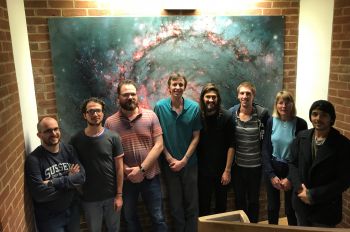Sussex proud to be part of major new project to explore mysteries of the universe
By:
Last updated: Thursday, 21 September 2017

Sussex scientists involved in a world-leading particle physics experiment aiming to solve some of the mysteries of the universe
The University of Sussex is heavily involved in a world-leading particle physics experiment aiming to solve some of the mysteries of the universe that has just received substantial UK Government backing.
Leading scientists from Sussex have been involved in the Deep Underground Neutrino Experiment (DUNE) since its inception and have spoken of their excitement after the £1.1 billion scheme moved a step closer.
Universities and science minister Jo Johnson announced on Wednesday that the UK would be investing £65 million into the project which will study the properties of neutrinos, a subatomic particle with very little mass, in a bid to discover more about how the universe works and why matter exists.
Sussex is one of 14 UK universities involved in the ambitious project which will see neutrinos fired from Fermi National Accelerator Laboratory (Fermilab) in Batavia, Illinois, at a particle detector in a defunct gold mine in South Dakota, 1300 km away.
Dr Jeff Hartnell, reader in experimental particle physics, said: "We at Sussex are incredibly proud and excited to be involved in such a major project.
"The scheme has huge potential to answer some fundamental questions about how the universe was formed.
"We are all very excited to be working closely with our colleagues both here in the UK and over in the US over the next few years."
New University of Sussex PhD student Alex Booth said: "I was really excited to hear the news, just as I arrived at Sussex this week.
“Having worked at Fermilab last year, I'm proud to be able to contribute to the big impact the UK will have on DUNE during my PhD."
Sussex has been working on Fermilab neutrino experiments since 1994 and PhD student Tristan Blackburn recently spent a year at the US lab working on a prototype detector.
Up to ten Sussex scientists will be involved in DUNE with a team of five from the university travelling to Illinois next month to finalise exciting results for the NOvA experiment - the forerunner to DUNE.
Sussex will also be well represented at the next DUNE collaboration meeting to be held at CERN [the European Organization for Nuclear Research] in Switzerland early next year.
Dr Hartnell is a principal investigator and he will be working alongside lecturer Dr Clark Griffith and senior lecturer Dr Elisabeth Falk on the data acquisition system. The gigantic 70,000 ton detector works like a 3D video camera and will generate over 1 Terabyte of raw data every second over the experiment’s expected 15 year lifespan.
Dr Simon Peeters, the university’s new head of experimental particle physics, will oversee the "trigger" development in the UK which will sort through the enormous amount of data in real time to find rare and interesting events.

